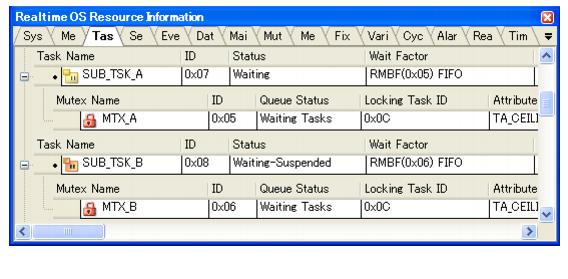|
|
An icon indicating the current status of the task and the name of the task are shown in the following format.
|
|
|
|
|
|
|
|
|
|
|
|
|
|
|
|
|
|
|
|
|
|
|
|
The ID of the task is shown.
|
|
|
The current state of the task is shown.
|
|
|
|
|
|
|
|
|
|
|
|
|
|
|
|
|
|
|
|
|
|
|
|
The task wait factor (type of WAITING state, object ID and attribute of WAITING state) is shown in the format below.
Type of WAITING state (Object ID) Attribute of WAITING state
Note that if the current state of the task is other than WAITING state or WAITING-SUSPENDED state, "--" appears.
If the WAITING state type is sleeping state or delayed state, then "(Object ID)" is not shown.
|
|
|
|
|
|
|
|
|
|
|
Waiting state for a semaphore resource
|
|
|
Waiting state for an eventflag
|
|
|
Sending waiting state for data queue
|
|
|
Receiving waiting state for a data queue
|
|
|
Waiting state for a mailbox
|
|
|
Waiting state for a mutex
|
|
|
Sending waiting state for a message buffer
|
|
|
Receiving waiting state for a message
|
|
|
Waiting state for a fixed-sized memory pool
|
|
|
Waiting state for a variable-sized memory pool
|
[Attribute of WAITING state]
|
|
|
AND waiting condition for a eventflag
|
|
|
OR waiting condition for a eventflag
|
|
|
|
|
|
|
|
|
Waiting for task priority order
|
|
|
The request conditions triggering the task's transition to WAITING state are shown.
Note that if the task's current state is other than waiting state for an eventflag, sending waiting state for a data queue, or waiting state for a variable-sized memory block, "--" is shown.
|
|
|
Waiting state for an eventflag
|
Data element to be sent to the data queue
|
Sending waiting state for a data queue
|
Memory block size to be acquired
|
Waiting state for a variable-sized memory block
|
|
|
The time left until the delayed state is released is shown. A unit of the time is millisecond. But the unit is a basic clock count when a denominator of base clock interval time (tic_deno) is 1.
If the task is in the WAITING state forever, "TMO_FEVR" appears.
Note that if the current state of the task is other than WAITING state or WAITING-SUSPENDED, "--" appears.
|
|
|
|
|
|
The current priority of the task is shown.
|
|
|
The start address of the task is shown.
|
|
|
The current PC value of the task is shown.
|
|
|
The current SP value of the task is shown.
|
|
|
The start address, end address, and size (in bytes) of the task stack are shown in the following format.
Start address - End address (Size)
|
|
|
The initial priority of the task is shown.
|
|
|
The suspension count of the task is shown.
|
|
|
The wakeup request count of the task is shown.
|
|
|
The activation request count of the task is shown.
|
|
|
The attributes of the task (the task's initial activation state and initial interrupt state) are shown in the following format.
Initial activation state Initial interrupt state
|
[Initial activation state of task]
|
|
|
|
|
|
|
[Initial interrupt state of task]
|
|
|
All interrupts are enabled at task activation.
|
|
|
The extended information of the task is shown.
|
|
|
The start address of the task exception handling routine is shown.
Note that if the task exception handling routine is undefined, the name will
|
|
|
The current status of the task exception handling routine is shown.
Note that if the task exception handling routine is undefined, the name will
|
|
|
|
|
|
|
|
|
The pending exception code of the task exception handling routine is shown.
Note that if the task exception handling routine is undefined, the name will
|
|
|
|
|
|
|

